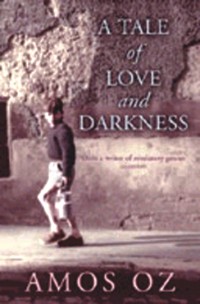|
Book
Review
The
Burden of Bistory
Amos
Oz
 Oz's
memoir, A Tale of Love and Darkness, thought to be the biggest-selling
literary work in Israeli history, is an exploration of why
his mother killed herself, and the effect on him, a sensitive,
intelligent boy growing up in Jerusalem during the last years
of the British mandate and the war of independence. It is
one of the funniest, most tragic and most touching books I
have ever read. I am a great admirer of Oz as a novelist,
of his spare, quiet portraits of intimacy between couples,
but here, in this long book, he reveals a huge talent for
the big narrative picture, for Dickensian character portraits
and an expert fusion of history and personal life. Oz's
memoir, A Tale of Love and Darkness, thought to be the biggest-selling
literary work in Israeli history, is an exploration of why
his mother killed herself, and the effect on him, a sensitive,
intelligent boy growing up in Jerusalem during the last years
of the British mandate and the war of independence. It is
one of the funniest, most tragic and most touching books I
have ever read. I am a great admirer of Oz as a novelist,
of his spare, quiet portraits of intimacy between couples,
but here, in this long book, he reveals a huge talent for
the big narrative picture, for Dickensian character portraits
and an expert fusion of history and personal life.
From the
outset the family bears down on you. His father, Ariyeh Klausner,
the thwarted academic in a land stuffed with the over-qualified
- "a sort of rootless, short-sighted intellectual with
two left hands". His grandfather, the follower of Ze'ev
Jabotinsky, the revisionist founding father of today's right-wing
Israeli politics: "He was a nationalist, patriot, a lover
of armies, victories and conquest, a passion-ate, innocent
minded-hawk... He had a weakness for everything grand, powerful
and gleaming - military uniforms, brass bugles, banners and
lances glinting in the sun, royal palaces and coats of arms.
He was a child of the 19th century, even if he did live long
enough to see three-quarters of the 20th century."
Here,
too, is the neighbourhood, obsessed with germs: "You
never actually managed to set eyes on an anti-semite or a
germ, but you knew very well they were lying in wait for you
on every side, out of sight." The city, Jerusalem, where
people schlepped along the streets: "If we picked up
our foot someone else might come along and snatch our little
strip of land. On the other hand, once you have lifted your
foot, do not be in a hurry to put it down again... time and
time again we have fallen into the hands of our enemies because
we put our foot down without looking where we were putting
them." Tel Aviv, spoken of almost confidentially, "as
though the city were some kind of crucial secret project of
the Jewish people", the sea "full of bronzed Jews
who could swim... Who had ever heard of swimming Jews?"
As he
grows up, the world outside the lower-middle class neighbourhood
of down-at-heel intellectuals opens up to reveal another population:
Jerusalem's middle-class Arabs. Taken to a tea party in the
home of a post office employee in honour of the British post-master
general, he goes into the garden and tries to impress a little
girl, puffed up with a sense of responsibility as a representative
of the Jewish people and of Zionism. Excited and already a
little in love, when she dares him to climb a mulberry tree
he instantly transforms himself from Jabotinsky to Tarzan,
from weedy yeshiva bocher to muscular Judaism, "the resplendent
new Hebrew youth at the height of his powers... a lion among
lions"; he finds an iron ball and chain at the top of
the tree, whirls it round his head like a lasso, loses control
over it, so that it lands with a bloody crash on the foot
of her little brother, who is toddling after a butterfly,
"and everything was silent all around you in an instant
as though you had been shut up inside an iceberg".
Oz's book
is a testament to a family, a time and a place. And throughout
it there is the voice of the child who, 50 years later, still
cries out for his dead mother.
This
article was first published in the Guardian
Copyright
(R) thedailystar.net 2004
|
